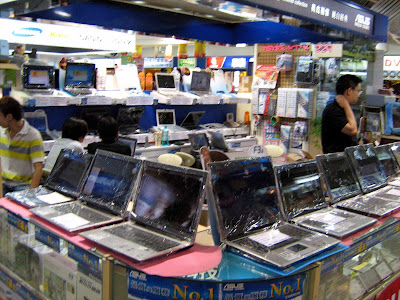 |
| An electronics shop in Taipei, July 2007 |
It was quite ironic that from July 23-27, while there was an all-out Information and Communication Technology (ICT) battle in Papua New Guinea between Digicel and Telikom, APEC member countries including PNG gathered in Taiwan to discuss this phenomenon of the so-called “digital divide”.
I happened to be in Taiwan at that time and could only shake my head in bewilderment as I browsed The National and Post-Courier newspapers on hi-tech wireless Internet for the latest news from home.
I might add here that while the newspapers were spot on, same could not be said of the Electoral Commission website, as there were no election updates the whole time I was in Taiwan.
The ICT monopoly in PNG, exorbitant telephone and Internet costs, as well as unupdated websites for such an event as the PNG national elections, all contribute to this digital divide.
Taiwan has a very reliable and cheap telecommunications system and is a hi-tech country where almost everyone has a mobile phone and a computer.
Wireless internet is everywhere, meaning that you can use your laptop anywhere, without the need for a wire connection.
Papua New Guinea will continue to remain light years behind the rest of the world if we do not jump on the ICT bandwagon in this globalised world.
As APEC member economies including PNG strive to build their ICT infrastructure necessary for the development of what economists called the “New Economy” – based on ICT – the phenomenon of the Digital Divide is also emerging.
To tackle the divide, the establishment of the APEC Digital Opportunity Centre (ADOC) was advocated by Taiwan at the 11th World Leaders’ Economic Summit in Bangkok, 2003.
It was envisaged as a concrete step towards realising the goals set out by APEC leaders at the 9th APEC meeting.
During this meeting, the e-APEC strategy was specified:
- Transform the Digital Divide into a digital opportunity; and
- Prepare APEC economies to use the Information Revolution as a passport to the New Economy.
Taiwan is currently working with seven APEC partner economies including PNG on the ADOC project.
The six other countries are Vietnam, Indonesia, Phillipines, Thailand, Chile, and Peru.
ADOC offices have been set up in each economy to run the various programmes and ICT training centres, referred to as “Digital Opportunity Centres”, have also been set up to facilitate with training and capacity-building objectives.
ADOC has been actively running programmes in PNG over the last three years, co-operating with various organisations and government departments, most notably with the Department of State Enterprise and Information.
In August 2006, ADOC established its PNG office and a state-of-the-art ICT training centre at the University of Technology in Lae.
The centre aims to provide digital opportunity – digital access and training – to those who have been traditionally marginalised by ICT: women, the unemployed and out-of-school youth.
The ADOC programme is coordinated by the ADOC Secretariat based in Taipei.
The Secretariat Office is currently run by the International Cooperation Development Fund and supported by the Institute for the Information Industry, two of Taiwan’s leading development and ICT organisations.
The ADOC project runs a number of different programmes in partner organisations as well as in Taipei.
One of these is the ADOC SME Programme, which I was invited to attend in Taipei.
It coincided with the third ADOC Week as delegates came together to share experiences and expertise on bridging the digital divide.
The workshop was aimed at providing participants from seven ADOC partner member economies with the fundamental knowledge of e-start ups.
The objective of the SME Entrepreneurship Workshop was to share with the participants the successful e-commerce start-up experience given by Taiwanese professional businessmen and senior manager, as well as the advanced e-business strategies and technologies which allowed the participants to have an idea about methods to cut into the current e-commerce market.
During the six-day workshop, Taiwan provided a variety of useful courses such as e-commerce management for SMEs and individuals regarding the aspects of e-business theory, legal issues and protections that outline the e-strategies of the e-business world.
Moreover, seminars and case studies gave a platform to exchange the e-start up experience among the participants and the lecturers.
In addition, a series of company visiting provided participants a chance of active learning outside the classroom.
Deputy executive director of the APEC Secretariat, Ambassador Juan Carlos Capunay, highlighted the importance of ICT in this globalised world.
“The digital divide within and among APEC member economies is an enormous barrier to the ability of the people in the Asia-Pacific region to participate in and benefit from the digital economy,” he said.
“Access to Internet, adequate infrastructure, human capacity building and appropriate policies on ICT are central issues in addressing the digital divide.
“Success in this globalised world is predicated on ICT knowledge and successful knowledge-based economies will be based on the efficient and widespread use of ICT by all sectors within any given country.
“Small and medium enterprises, the backbone of Asia-Pacific economies, must be prepared with ICT knowledge.
“If they are not ICT savvy, they will not receive the benefits of globalisation and they will be left behind.”
Ambassador Capunay could have been speaking directly to PNG.
No comments:
Post a Comment